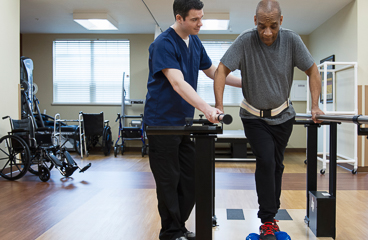
What is stroke rehabilitation?
Stroke rehabilitation (rehab) is training and therapy to help you recover and prevent problems after a stroke. The team may help you learn new ways to do daily activities. The focus of rehab will depend on how the stroke has affected your ability to do the things you want and need to do.
Rehab may begin in the hospital. It starts as soon as you are able. You will have a team of doctors, nurses, and therapists. The team can help you in many ways. For example, the team may help you learn new ways to do daily activities such as eating, bathing, or dressing. They can teach you to prevent problems like falls or burns. Some people need help to learn how to walk or talk again. If the stroke affected your memory, you will learn ways to improve it.
You may recover the most in the first few weeks or months after your stroke. But even with rehab, you may not be able to do all the things you could before the stroke. But you can continue to get better even after the first few months.
After the hospital, you may go to a rehab facility or a nursing home for a while. Or you may go home. Wherever you go, keep working on your rehab and do a little every day.
It's going to be important for you to get the support you need. Your friends and family can help you. Involve them in your treatment. They can be part of your rehab team. Talk to others who have had a stroke, and find out how they handled ups and downs.
How can stroke rehab specialists help?
Your stroke rehab team will include doctors and nurses who specialize in stroke rehab, as well as other professionals. Each team member will help you in specific ways. The team may include the following professionals.
- Rehab doctor
-
A rehab doctor is a specialist in charge of your rehab program. The doctor may also work on special problems, such as muscle cramps and spasms.
- Rehab nurses
-
Rehab nurses can help you in many ways. They may help you learn new ways to do daily activities. For example, they can help you learn how to:
- Take care of your health, including a schedule for medicine.
- Get from your bed to a wheelchair.
- Bathe.
- Control your bowels or bladder.
- Physical therapist
-
A stroke often takes away a person's ability to move in certain ways. A physical therapist helps you get back as much movement, balance, and coordination as possible.
Physical therapy usually includes exercises. The exercises can help you get back your ability to walk and move as much as possible. It's important to practice these exercises over and over again.
Your therapist may also help you learn to use a wheelchair or walker. And they may teach you how to use stairs safely.
- Occupational therapist
-
An occupational therapist helps you practice daily tasks like eating, bathing, dressing, and writing. For example, they may help you learn how to:
- Prepare meals and clean your house.
- Drive your car.
- Use tools and devices that can help if you no longer have full use of both hands. For example, velcro can replace buttons on clothing.
- Get grab bars for your bathroom.
- Make your home safe if you have strength, balance, or vision problems.
- Speech-language pathologist
-
A speech-language pathologist can help you relearn how to talk or find new ways to express yourself.
Swallowing is sometimes a problem after a stroke. This therapist can help you improve your ability to swallow.
This therapist can also help you work on reading and writing skills.
- Dietitian
-
A dietitian can help you learn about nutrition and create a heart-healthy eating plan.
- Psychologist or counselor
-
Emotions like fear, anxiety, anger, sadness, frustration, and grief are common after a stroke. A psychologist or counselor can help you deal with your emotions. They can also help you get treatment if you have depression.
- Vocational counselor
-
Stroke can leave you with disabilities that make it hard to do your job. A vocational counselor can help you return to your job or find a new one. They can help you:
- Identify your current skills and prepare a new resume.
- Search for a job.
- Understand the laws that protect disabled workers.
- Recreational therapist
-
A recreational therapist helps you return to doing things you enjoy. This may include the arts, hobbies, sports, or leisure activities.
- Social worker or case manager
-
A social worker or case manager can help you and your caregivers arrange for the help and equipment you may need at home after you leave the rehab center.
Follow-up care is a key part of your treatment and safety. Be sure to make and go to all appointments, and call your doctor if you are having problems. It's also a good idea to know your test results and keep a list of the medicines you take.
Where can you learn more?
Go to http://www.healthwise.net/patientEd
Enter A614 in the search box to learn more about "Learning About Stroke Rehabilitation".
Current as of: July 31, 2024
Author: Ignite Healthwise, LLC Staff
Clinical Review Board
All Healthwise education is reviewed by a team that includes physicians, nurses, advanced practitioners, registered dieticians, and other healthcare professionals.

